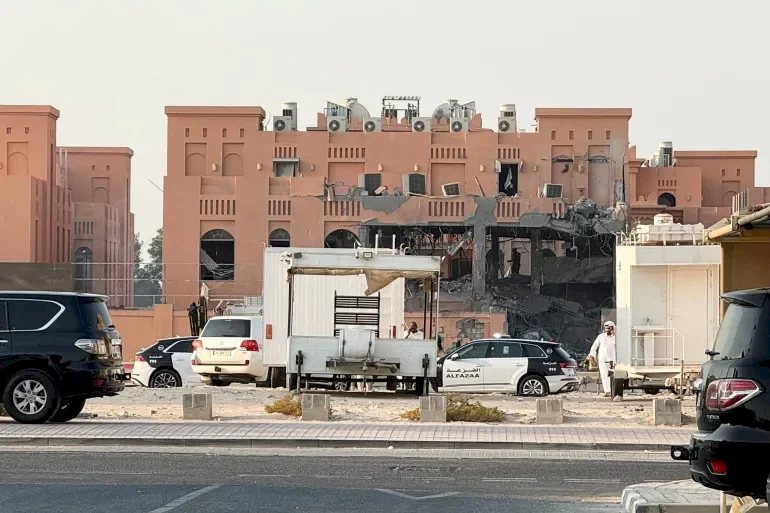
Washington Post: Israeli Attack Raises Gulf Doubts About American Protection
SadaNews - A report published by the Washington Post quoted analysts as saying that the Israeli raid on Qatar last week forced the Gulf Arab states to confront the reality of the weakness of the protection provided by their American ally, and pushed them to seek responses that might deter any future attacks.
The report, prepared by the newspaper's correspondent Karim Fahim, stated that Israel's execution of the attack sparked a wave of anger and a sharp sense of insecurity in the Gulf.
It pointed out that neighboring countries may conclude that Qatar, which has close ties and interests with the United States, has itself been attacked, and that it is also at risk.
Concerned
The report attributed to Ibrahim Al-Aseel, a senior fellow at the Atlantic Council, his statement, "They are certainly concerned. They feel less secure and protected than they were before."
Fahim mentioned that the attack, which seemingly faced no objection from American defenses, was the second to shake the Gulf in less than three months, following the Iranian missile attack on Qatar last June.
He pointed out that the attacks that raised concerns in the Gulf in recent years often came from Iran or from the Houthis in Yemen, but the attack on Doha came from Israel, a close ally of Washington, which crossed a "red line".
He noted that the United States appears unwilling or unable to restrain Israel, even when it threatens or attacks other American allies.
Unreliable Partner
The report quoted Hassan Hassan, a senior fellow for Middle Eastern policies at the International Institute for Strategic Studies, stating that the close relationship between the United States and Israel made this strike qualitatively different from previous cases, "It reinforces the prevailing feeling that America is an unreliable security partner."
Hassan added that Washington, aside from some expressions of discontent with Israel, refrained from imposing punitive measures that could stop "Israel's rampant and unrestrained military aggression in the region."
He indicated that Qatar hosting leaders of the Islamic Resistance Movement (Hamas) does not necessarily make it more vulnerable to attack than others, as other Gulf states have adopted stances opposed by Israel.
For instance, Saudi Arabia has pushed for the establishment of a Palestinian state. Oman played a mediating role between the Houthis and the West. Despite the peace agreement with Israel, the UAE declared that annexing the West Bank would be a "red line."
No Need for a Pretext
According to Hassan, it is not unlikely that these stances could lead to Israeli military action, adding, "Israeli Prime Minister Benjamin Netanyahu does not need a pretext."
The writer reiterated that Gulf trust in the United States has been eroding for years, under both Republican and Democratic administrations.
Washington has been viewed - amidst what seems to be an "American strategic shift" away from the Middle East towards Asia - as overlooking urgent security concerns, including the Iranian threat. The diminishing of America's reliance on Middle Eastern oil and gas has made the region a lower priority.
Al-Aseel speculated, according to the report, that the events might push Gulf states to demand clearer security guarantees from Washington, alongside enhancing regional coordination, including intelligence sharing among themselves and with foreign governments.
He stated, "This is a small region. Any attack on Qatar or other countries in the area could easily drag in neighbors, causing damage to their economies and their image as oases of stability in a troubled region."
Undermining Previous Assumptions
Al-Aseel expected that this fragility would lead Gulf states to understand the limits of American guarantees, "this will push them to change."
Hassan clarified that Gulf states believed they had special relations with Trump, based on their ability to offer him business deals, and hoped that would influence his vision and policies. However, the attack on Qatar undermined those assumptions.
He said, "The tragedy is that Gulf states do not have a good alternative to guarantee their defense and security. China and Russia are not considered reliable alternatives, and local defense initiatives are still being developed."
Hassan concluded by stating that over-reliance on the United States is deeply rooted and difficult to break away from.
Source: Washington Post

Report: Trump May Order Attack on Iran Next Sunday

Trump: Iran Wants to Reach an Agreement.. and Knows the "Deadline"

Shaath: Rafah Crossing will be opened in both directions starting next Monday

America Imposes Sanctions on Several Iranian Officials Including the Interior Minister

CENTCOM: An American Fighter Jet Departed the Lincoln Carrier for Routine Flights in the A...

Report Warns: Iran is Weary but Still 'Deadly'

Israeli Supreme Court Postpones Again Review of the Appeal Against Anti-UNRWA Laws

